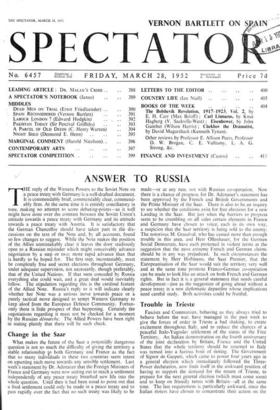Change in the Saar
-What makes the future of the Saar a potentially dangerous question is not so much the difficulty of giving the territory a stable relationship to both Germany and France as the fact that so many individuals in these two countries seem intent on upsetting each move towards any sensible settlement. Last week's statement by Dr. Adenauer that the Foreign Ministers of France and Germany were now setting out to reach a settlement independently of any peace treaty breathed new life into the whole question. Until then it had been usual to point out that a final settlement could only be made in a peace treaty and to pass rapidly over the fact that no such treaty was likely to be made—or at any rate, not with Russian co-operation. Now there is a chance of progress, for Dr. Adenauer's statement has been approved by the French and British Governments and the Prime Minister of the Saar. There is also to be an inquiry to see whether the conditions exist for free elections for a new Landtag in the Saar. But just when the barriers to progress seem to be crumbling on all sides certain elements in France and Germany have chosen to voice, each in its own way, a suspicion that the Saar territory is being sold to the enemy. The notorious M. Grandval, who has caused more than enough trouble in this area, and Herr 011enhauer, for the German Social Democrats, have each protested in violent terms at the suggestion that the most extreme French and German claims should be in any way prejudiced. In such circumstances the statement by Herr Hoffmann, the Saar Premier, that the Europeanisation of the Saar would suit the territory very well and at the same time promote Franco-German co-operation can be made to look like an attack on both French and German rights. But in fact it is a general statement that needs careful development—just as the suggestion of going ahead without a peace treaty is a new diplomatic departure whose implications need careful study. Both activities could be fruitful.


































